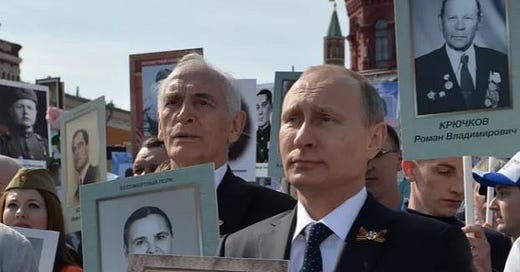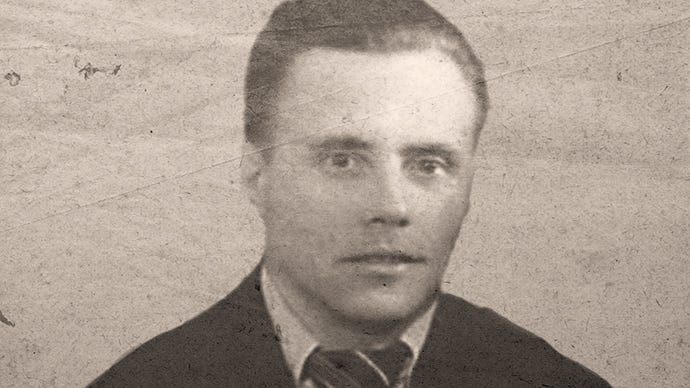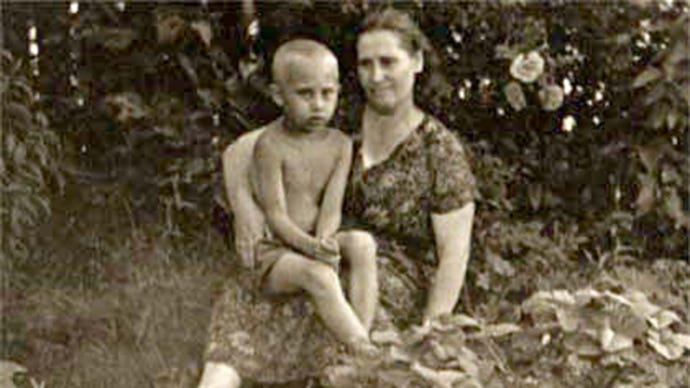Countries from all over the world sent their leaders to Moscow for Victory Day.
Zelensky sent drones. 540 to kill innocent civilians o mark the occasion . Almost all were shot down.
The Western media, as with every Victory Day since Putin took power, was quick to dismiss the event as Pobedobesie, a kind of war frenzy with religious overtones.
They criticized Putin’s support for the Russian Orthodox Church, one of several official religions in Russia- and banned in Ukraine with pogroms of the faithful.
Under Putin, Second World War celebrations have become central to state ideology. The young president attended a Victory Day parade on Red Square just two days after ascending to office in 2000, and he has since transformed the day into a centrepiece of state religion. The increasingly bombastic celebration of Russia’s role in the Second World War has been described many ways, from “cult” to pobedobesie, a Russian neologism that decries the obsession as “victory fever”. But above all, this celebration bears all the hallmarks of a religion. It has its own holidays (on 9 May and other dates that mark great victories); its own temples (which take the form of memorial and museum complexes both Soviet and new); and holy scripture in the form of novels, films, and textbooks that reiterate a myth of religious sacrifice.
In the story propagated by these scriptures, millions of Russians sacrificed themselves in the 1940s to save their nation and the whole of humanity from the German threat. A militarised distortion of the story of Christ, this gospel holds that Russians had to fight and die in order to bring humanity back from the dead in 1945. Equally, today’s Russian troops are purportedly “saving” Russia, and Ukraine too, from a West destroying itself, and every Christian nation, through the promotion of – as Putin has repeatedly claimed – gender ideologies, paedophilia and satanism.
Each of these touchpoints, whether holiday, temple, or story, reiterates the message that Russia is fated to be surrounded by enemies. The country’s inexorable religious mission is to embark on crusade after crusade to rescue humanity from heathen destroyers – fascists, Nazis, Germans, Americans, the British. Such was the case in 1812, when Russia repelled the Napoleonic invader, and in 1941-45, and so must it be today
If you read my special article 3 in the Putin series you will understand that the West has an alternative history for...well...everything. Which sadly requires them to fictionalize history. Whatever you learned in school — forget it.
The West if fighting for “freedom” for all, except if you are Asian or African of an uppidty Latin, most especially Palestine - the “Other Semites”.
Russia is pathologically paranoid for no other reason than having been a pariah state since the 18th Century, and invaded by the French, the Turks, the British, the Japanese, the Allies in 1918, the Germans, with CIA attempts at terrorist subversion in the 90s. Then with Western attempts on its borders in Georgia and Ukraine.
Paranoid? Hitler said the same thing. Then invaded.
The West scoffed at Putin’s speech as simple jingoism.
What does he know about war? He was born after WWII! By jingo!
What does he know about the suffering by jingo? Has he been to Harvard or Yale?
Why does he call the Russian soldiers and militias from Novorossiya in Ukraine “heroes’ with legislation to award their service after the war with advancement in all parts of Russian society as the leaders with proven commitment, rather better than the GI Bill, which was the same concept.
Russian militarism to be sure.
But Putin’s sense of these things comes from personal history, not the stuff you learn in school. It comes from the lives of Mom and Dad Putin. Yes, there was more than one Putin He did not come from nowhere.
No one asks about his parents. Or what WWII did to them - but it is important to understanding the son.
Vladimir Putin was was born a child of the People, living a first in communal housing, where everyone had to help each other – and everyone shared their experiences in a war then too close at hand. just as they shared kitchens and bathrooms.
Unlike Keith Starmer or Biden or Trump, young Vlad’ was ot born with a gold spoon in his mouth. He didn’t have a spoon at all.
In researching Putin for my Special Article 4 on Putin I found that I had rely on Russian sources, which are diverse, with many points of view focusing on different aspects of the man — unlike the Western story, which is simple: Putin=Evil.
His remarkably honest memories below in an article he has written.
You judge.
To be honest, FATHER didn’t like to even touch on this topic. More like this. When adults talked to each other and reminisced about something, I was just there. All my information about the war, about what was happening to the family, came from these conversations between adults. But sometimes they addressed me directly.
My father did his military service in Sevastopol, in a submarine detachment, he was a sailor. He was called up in 1939. And then, when he returned, he simply worked at the plant, and he and my mother lived in Peterhof. I think they even built a house there.
The war began, and he worked at a military enterprise, where there was a so-called “reservation”, exempting from conscription. But he wrote an application to join the party, and then another application - that he wanted to go to the front. They sent him to a sabotage detachment of the NKVD. It was a small detachment. He said that there were 28 people there, they were thrown into the near rear to carry out sabotage. Blowing up bridges, railways... But they were almost immediately ambushed. Someone betrayed them. They came to one village, then left from there, and when they returned some time later, the fascists were already waiting for them there. They chased him through the forest, and he survived because he climbed into a swamp and sat in the swamp for several hours and breathed through a reed. I remember this from his story. Moreover, he said that when he was sitting in the swamp and breathing through this reed, he heard German soldiers passing by, literally a few steps away from him, dogs barking...
In addition, it was probably already the beginning of autumn, that is, it was already cold... I also remember well how he told me that their group was led by a German. A Soviet citizen at that. But a German.
And what's interesting is that a couple of years ago, a file on this group was brought to me from the archives of the Ministry of Defense. I have a copy of this file at home in Novo-Ogaryovo. A list of the group, last names, first names, patronymics and brief descriptions. Yes, 28 people. And at the head - a German. Everything is as my father told me.
Of the 28 people, four crossed the front line back to ours. 24 died.
And then they were sent to be reorganized into the active army - and to the Nevsky Pyatachok. This was probably the hottest place during the entire blockade. Our troops held a small bridgehead. Four kilometers wide and a little over two kilometers deep. It was assumed that this would be a bridgehead for a future breakthrough of the blockade. But it never happened to be used for these purposes. The blockade was broken through in another place. Nevertheless, they held the patch, held it for a long time, there was heavy fighting there. Very heavy. Above it are dominating heights, they shot right through it. The Germans, of course, also understood that a breakthrough could occur there, and they tried to simply wipe the Nevsky patch off the face of the earth. There is data on how much metal lies in each square meter of this land. It is still solid metal.
And my father told me how he was wounded there. The wound was serious. He lived his whole life with shrapnel in his leg: they never took them all out. His leg ached. His foot never straightened afterwards. They preferred not to touch the small shrapnel, so as not to shatter the bones. And, thank God, they saved his leg. They could have taken it away. He got a good doctor. He had a disability, group II. As a war invalid, he was eventually given an apartment. It was our first separate apartment. A small two-room apartment. True, before that we lived in the center, but we had to move. Not exactly to the outskirts, true, but to new buildings. And this happened, of course, not immediately after the war, but when I was already working in the KGB department. And they did not give me an apartment then, but they finally gave it to my father. It was a great joy. And here is how he was wounded. He and his friend made a small sortie behind the German lines, crawled and crawled... And then it was both funny and sad: they got close to a German pillbox, a healthy guy came out of it, my father said, looked at them... and they couldn't get up, because they were under the gun's sights. "The guy," he says, "looked at us carefully, took out a grenade, then a second one and threw these grenades at us. Well, and..."Life is such a simple thing and cruel.
And what was the main problem when he came to? That it was already winter, the Neva was frozen, he needed to somehow get to the other bank, to help, qualified medical care. But he himself, of course, could not walk.
True, he still managed to get to his people on this side of the river. But there were few who wanted to drag him to the other side, because the Neva was in the palm of his hand and was under fire from both artillery and machine guns. The chances of reaching the other bank were almost zero.But quite by chance his neighbor in Peterhof happened to be nearby. And this neighbor, without thinking, dragged him. And dragged him to the hospital. Both of them crawled there alive. The neighbor waited for him in the hospital, made sure that he had been operated on, and said: "Well, now you will live, and I will go to die."
And he went back. And I later asked my father: "Well, did he die?" And he returned to this story several times. It tormented him. They got lost, and my father still believed that his neighbor had died. And somewhere in the 60s, I don't remember the exact year, I was still little, but somewhere in the early 60s, he suddenly came home, sat down on a chair and cried.He met his savior. In a store. In Leningrad. By chance. He went into the store to buy groceries and saw him. Imagine, that they both went to this store at that very moment. One chance in a million... Then they came to our house, met...
And my mother told me how she came to visit my father in the hospital, where he was lying after being wounded. They had a small child, he was three years old. And there was hunger, the blockade... And my father gave her his hospital rations. Secretly from the doctors and nurses. And she hid it, took it home and fed the child.
Well, then he started fainting from hunger in the hospital, the doctors and nurses realized what was happening and stopped letting her in.
And then they took her child away from her. They did this, as she later repeated, without warning, with the aim of saving young children from starvation. They gathered them in orphanages for subsequent evacuation. They didn’t even ask their parents.
He got sick there — his mother said it was diphtheria — and didn’t survive. And they weren’t even told where he was buried. They never found out. And then last year, some people I didn’t know, on their own initiative, worked in the archives and found documents on my brother. And he really is my brother.Because I knew that they were living then, after they fled from the advancing German troops from Peterhof, with their friends — I even knew the address. They lived, as we say, on the Water Canal. It would be more correct to say “on the Obvodny Canal,” but in Leningrad they call it the “Water Canal.” I know for sure that they lived there. And not only the address from where he was taken matched. The name, surname, patronymic, year of birth matched. It was, of course, my brother. And the burial place was indicated: Piskarevskoye Cemetery. And even the specific plot was indicated.
None of this was reported to the parents. Well, then, apparently, there was no time for it.
So everything my parents told me about the war was true. They didn’t make up a single word. They didn’t move a single day. And about my brother. And about my neighbor. And about the German – the group commander. Everything was exactly the same. And all of this was later confirmed in some incredible way.And my father, when the child was taken away and my mother was left alone, and he was allowed to walk, got up on crutches and went home. When he got to the house, he saw that the orderlies were carrying corpses out of the entrance. And he saw my mother. He came up to her, and it seemed to him that she was breathing. And he said to the orderlies: “She’s still alive!” “She’ll get there on the way,” the orderlies told him. “She won’t survive.”
He said that he attacked them with crutches and forced them to lift her back into the apartment. They told him: “Well, we’ll do whatever you say, but know that we won’t be coming here again for another two, three, four weeks. You’ll figure it out yourself then.” And he nursed her back to health. She survived. And she lived until 1999. And he died at the end of 1998.
After the blockade was lifted, they moved to their parents' homeland, to the Tver province, and lived there until the end of the war. My father's family was quite large. He had six brothers, and five died. It was a catastrophe for the family. And my mother's relatives died. And I turned out to be a late child. She gave birth to me at 41.
And there was no family where someone did not die. And, of course, grief, misfortune, tragedy.But they did not hate the enemy, that's what's amazing. To be honest, I still can't fully understand this.
My mother was generally a very gentle, kind person... And she said: "Well, what kind of hatred can there be for these soldiers? They are ordinary people and they also died in the war." It's amazing.
We were raised on Soviet books, films... And we hated them. But for some reason she didn't have that at all. And I remember her words very well: "What can you expect from them? They are the same hard workers as we are. They were just driven to the front."
I remember these words from my childhood.
Want to understand someone? Look at the home that shaped them.
Notable in Putin’s essay is his views on hate.
He obviously believes that people have to be taught to hate — whatever side they take. The lesson of humanity is to learn to accept . It is not ordinary people who are blame for war. That is what Putin learned from his parents, which contradicted what he was taught elsewhere.
So Putin learned to read “history” critically —beyond official narratives— to think for himself.
Yet, one must fight sometimes, as when his father attacked the hospital orderlies with his crutches to save his mother—and as Putin did in elementary school attacked by bullies—and as Russia did in 2022.
Hence his firmness and resolve in the SMO and towards Ukraine’s western masters.
But Putin does not hate. And would rather negotiate
Hard Day?
I know someone who can help.
Both Chappy and Ichi do massage.






Wow! Those Russians sure are crazy and have turned WW2 into a state religion! You mean like Veterans Day, Armistice Day, Poppies and half the monuments in London and DC?
From what I have learned recently: Because of the 27 million who died there are very few people in Russia who do not have a family member/neighbour who died.
This is truly important to remember which is why their Remembrance Day is so important.
Thanks Julian.